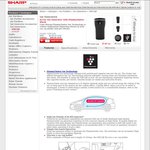In-Car Ion Generator with Plasmacluster
Uses Sharps Plasmacluster Ion Technology to reduce unpleasant lingering odours in your car, eg smoke and pet odours
PlasmaCluster Ion Technology
Plasmacluster Ion technology releases both positive and negative ions into the air. The cluster ions diffuse throughout the car, surrounding airborne allergens, turning them into harmless substances like water. The benefits of using the IGBC2JB in your car are eliminating unpleasant lingering odours like cigarette smoke, pet odours, removes musty car smells and airbourne viruses.
Plasmacluster ions are released at a 20 degree upwards angle and are carried along the ceiling of the car to every part of the interior by the Coanda effect. (Coanda effect: when a jet of air or water is discharged, it tends to travel along a nearby curved surface for a considerable distance, even to the point of bending around corners)


How much does it normally cost ?